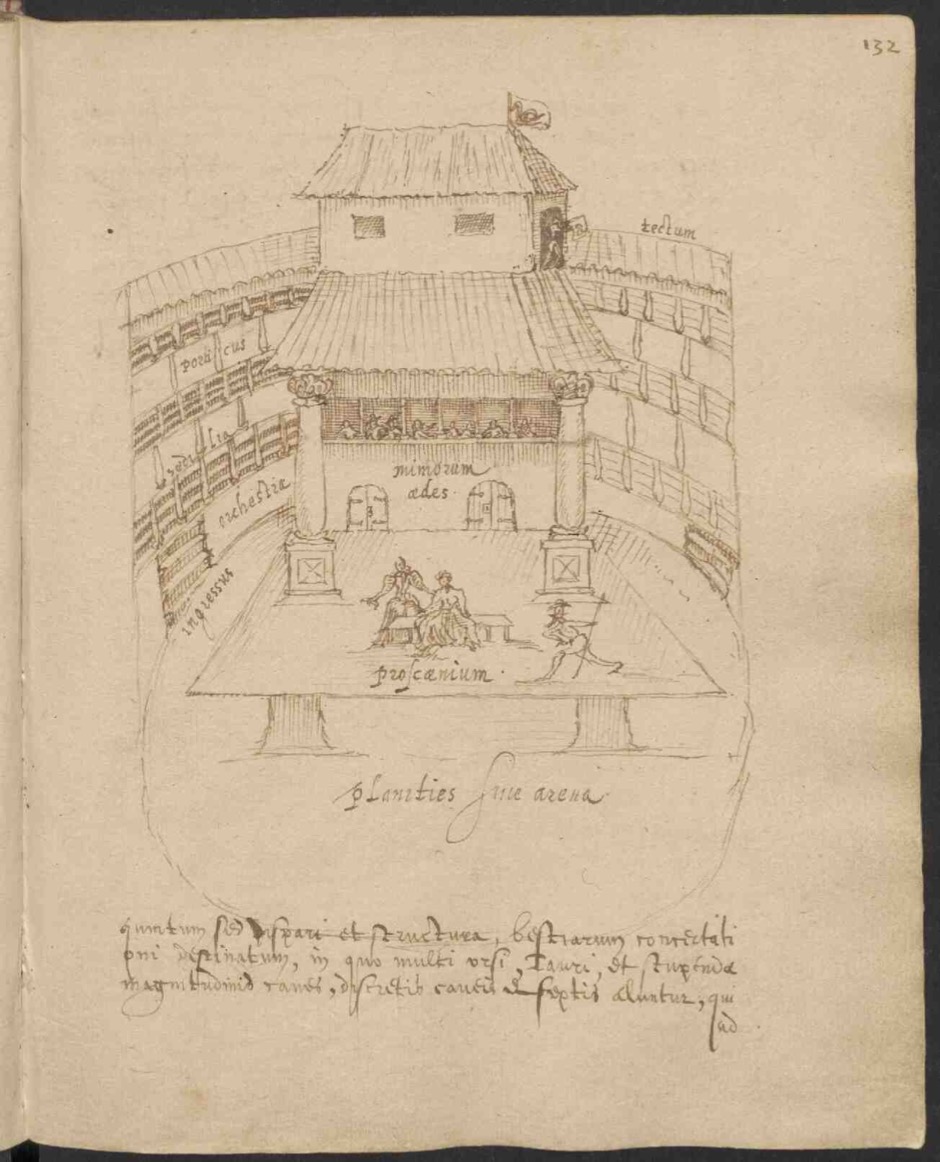- About MAA
- Membership
- MAA Publications
- Periodicals
- Blogs
- MAA Book Series
- MAA Press (an imprint of the AMS)
- MAA Notes
- MAA Reviews
- Mathematical Communication
- Information for Libraries
- Author Resources
- Advertise with MAA
- Meetings
- Competitions
- Programs
- Communities
- MAA Sections
- SIGMAA
- MAA Connect
- Students
- MAA Awards
- Awards Booklets
- Writing Awards
- Teaching Awards
- Service Awards
- Research Awards
- Lecture Awards
- Putnam Competition Individual and Team Winners
- D. E. Shaw Group AMC 8 Awards & Certificates
- Maryam Mirzakhani AMC 10 A Awards & Certificates
- Two Sigma AMC 10 B Awards & Certificates
- Jane Street AMC 12 A Awards & Certificates
- Akamai AMC 12 B Awards & Certificates
- High School Teachers
- News
You are here
“A Magazine of all perfection”: Mathematics in the Early Modern Satire Histrio-Mastix – The Plot and Characters

Figure 6. Drawing of a performance in progress at the Swan Theatre outside London,
sketched in 1596 by Johannes de Witt (1566–1622) and copied by Arend van Buchell (1565–1641)
in Adversaria (ca 1592–1621, fol. 132), a manuscript diary of correspondence and observations.
Notice the characteristic Elizabethan open theatre. Utrecht University Special Collections.
The plot of Histrio-Mastix centres on the theme of peace and its fragility after a conflict or war. The entire play serves as an allegory for how quickly society will challenge peace. In the beginning of the play, we meet the character Peace, who is a literal personification of peace. The character discusses how to rebuild society after a devastating conflict with the seven muses of the liberal arts (grammar, logic, rhetoric, arithmetic, geometry, music, and astronomy), who all agree that they have a role to play in keeping the peace.
After this opening chorus, various groups of characters are introduced to represent different classes in an unnamed country, beginning with the higher classes of scholars, lawyers, and merchants. Readers are introduced to the gentlemen Mauortius, Philarchus, Hiletus, Larius, and Chrisoganus, who are each asked by Peace to select one of the seven liberal arts and sciences to master. First chosen are music, geometry, rhetoric, and astronomy, perhaps indicating an ordering of the common appeal to the gentlemen, over arithmetic, logic, and grammar. Chrisoganus, who is the last to choose, ends up picking all of the seven liberal sciences and becomes not only a scholar and a polymath, but by presenting his epistemological views, he also develops into a mathematician in all but name. However, Chrisoganus’s most important function in the play is to guide and lead his fellow citizens so that the fragile peace of the country will last.
As the play progresses, additional classes of characters are brought into the plot, ending up with the introduction of citizens from the lowest part of society, represented by Incle, Belch, Gutt, and Post-Hast. Unlike the upper-class characters, these new persons are easily bored; Post-Hast soon decides that they should put on a play to pass the time. Gradually, the characters become more and more thirsty for entertainment, and soon their ennui results in the slow but certain move towards unrest as Chrisoganus fails to prevent vices such as sloth, pride and envy from showing up (also as literal characters). The country then is once again at war, before Peace (both the character and the state of affairs) eventually is restored at the end of the play and the vices are banished.
Laura Søvsø Thomasen (Royal Danish Library) and Henrik Kragh Sørensen (University of Copenhagen), "“A Magazine of all perfection”: Mathematics in the Early Modern Satire [i]Histrio-Mastix[/i] – The Plot and Characters," Convergence (December 2024)




